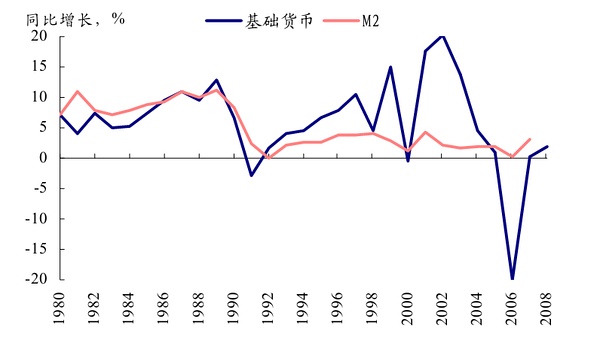(单词翻译:单击)
China has launched a fresh effort to boost its flagging economy with cash injections by the central bank, but signs are mounting that monetary stimulus is losing its effectiveness as debt-ridden companies lose their appetite for borrowing even at low rates.
中国发起了提振乏力经济增长的最新努力,由央行注入现金。但越来越多的迹象表明,随着债务缠身的企业失去对哪怕是低息借款的兴趣,货币刺激正在失去其有效性。

‘Mini-stimulus’ measures launched in April were focused on increasing the supply of money and credit. Last week the central bank moved to inject $81bn into the system via loans to the five biggest banks. That followed targeted cuts to the required reserve ratio for small banks and a loosening of the regulatory loan-to-deposit ratio that gave banks greater freedom to expand lending.
今年4月出台的“微刺激”措施聚焦于增加货币和信贷供应。上周中国央行采取行动,通过向五大银行发放贷款,向金融体系注入5000亿元人民币(合810亿美元)。此前,中国央行对一些小银行有针对性地下调了存款准备金率,针对银行贷存比的监管上限也有所放松,使银行有更大自由度可以扩大放贷。
Authorities want the banks to channel those funds into the real economy, but bankers and analysts say that weak credit creation in recent months is due more to lack of demand from borrowers than to constraints on bank lending.
当局希望银行将这些资金导向实体经济,但银行家和分析师表示,近几个月信贷疲软,在更大程度上是因为借款人缺乏需求,而不是因为银行放贷受到制约。
That raises the spectre that China may slip into a so-called “balance-sheet recession”, the kind of economic slump in which monetary policy loses its effectiveness because highly indebted companies concentrate on paying down debt and remain unwilling to borrow even when interest rates fall. Weak demand for goods amid a slowing economy further depresses appetite for investment.
这引发了中国可能陷入所谓“资产负债表衰退”的可怕前景,在这种经济低迷情形中,货币政策失去有效性,因为债台高筑的企业专注于偿还债务,即使利率下降也仍不愿借款。经济放缓之际商品需求疲软,进一步抑制了投资意愿。
“Anyone who runs a company with high leverage is very sensitive to the prospects for final demand,” said Richard Koo, the Nomura economist who pioneered the concept of a balance-sheet recession in his analysis of Japan’s post-bubble stagnation in the 1990s.
“任何在高杠杆下经营公司的人,都对最终需求的前景非常敏感,”野村(Nomura)经济学家辜朝明(Richard Koo)表示。他在分析日本在20世纪90年代泡沫破灭后陷入的停滞时,率先提出了资产负债表衰退的概念。
He has applied the same analysis to the post-crisis economies of the US, EU and UK, where huge expansions of the base money by central banks have largely failed to spur bank lending to the real economy. “If everyone is happy and spending big, then leverage isn’t a big issue,” said Mr Koo. “That was the way Japanese companies operated until the end of the 1980s. But once things reverse, they have to be super cautious. At least some Chinese companies are now acting the same way.”
他对美国、欧盟和英国在危机后的经济进行了相同的分析,在这些经济体,央行巨幅扩大货币基础之举,基本上未能刺激银行向实体经济放贷。“如果大家都情绪良好、大笔支出,那么杠杆不是一个大问题,”辜朝明表示,“日本企业在20世纪80年代末之前就是这样运作的。但一旦形势扭转,它们就得超级谨慎。至少部分中国企业如今也呈现出这种行为方式。”
Indeed, a central bank survey released on Friday showed that bankers saw declining demand for loans in the third quarter, while a separate survey showed that manufacturers are increasingly pessimistic about the economy.
的确,上周五公布的一项央行调查显示,银行家们看到第三季度贷款需求下降,而另一项调查显示,制造商对经济越来越悲观。
The survey results help to explain data released earlier this month showing that bank loans outstanding rose by only 13.3 per cent year on year in August, the weakest pace since 2005.
这些调查结果有助于解释本月早些时候发布的数据,那些数据显示8月份未偿还银行贷款同比仅增长13.3%,这是2005年以来最疲弱的增幅。
Analysts still believe the Chinese government could spur credit and investment growth with aggressive monetary easing, including a rate cut and so-called “window guidance” from regulators instructing banks to boost lending.
分析师们仍相信中国政府可能出台激进的货币宽松政策以刺激信贷和投资增长,包括降息和监管机构指示银行增加放贷的所谓“窗口指导”。
But bankers say good lending opportunities are scarce, even as regulators have relaxed the enforcement of rules like the maximum 75 per cent loan-to-deposit ratio, which has long served as a big constraint on bank lending.
但银行家们表示,好的放贷机会很少,尽管监管机构已放宽了规则的执行,如75%的贷存比上限——这个上限长期以来是银行放贷的一大制约因素。
“The LDR has been relaxed, and liquidity has increased, but it’s still hard to place loans. When the [stimulus] news broke, banks all rushed to buy bonds. The money hasn’t flowed into the real economy,” said an executive at a midsize commercial bank in Shanghai.
“贷存比已经放松,流动性有所提高,但仍然很难发放贷款。(刺激)消息传出后,银行都争相购买债券。这些钱并没有流入实体经济,”上海一家中型商业银行的一位高管表示。
Rising debt is at least partly to blame. The massive stimulus Beijing launched in response to the financial crisis sent its overall debt-to-GDP ratio soaring to 251 per cent by the end of June, from 147 per cent at the end of 2008, according to Standard Chartered estimates.
不断增加的债务至少是部分原因。根据渣打银行(Standard Chartered)的估算,北京方面为应对金融危机而出台的大规模刺激,使中国总体债务与国内生产总值(GDP)之比从2008年底的147%,增至今年6月底的251%。
Mr Koo and others say a fully-fledged balance-sheet recession would require a much steeper fall in Chinese asset prices.
辜朝明等人表示,全面爆发资产负债表衰退的一个前提是,中国出现更剧烈的资产价格下跌。
Property prices have fallen for four straight months, but the magnitude of the fall is still far below the catastrophic collapses seen in Japan in 1990 or the US in 2008. The theory of a balance-sheet recession implies that when impaired corporate balance sheets weaken the private sector’s appetite for borrowing and investment, the government must fill the gap with fiscal spending.
房产价格已连续四个月下跌,但跌幅仍远低于日本在1990年——或美国在2008年——出现的灾难性崩盘。资产负债表衰退理论意味着,当受损的企业资产负债表减弱私营部门的借款和投资意愿时,政府必须以财政支出来填补这一缺口。
China dabbled with this approach earlier this year, as the fiscal deficit briefly spiked amid increased spending on rail and other areas. But if private spending weakens further, Chinese policy makers may be forced to overcome their traditional aversion to big fiscal deficits and adopt more muscular stimulus.
中国今年早些时候尝试过这种做法:铁路等领域的支出增加,财政赤字短暂飙升。但如果私营部门的支出进一步减弱,中国的政策制定者可能不得不克服历来对庞大财政赤字抱有的反感,出台更大力度的刺激。
George Magnus, senior economic adviser for UBS, argues China should welcome the fall in borrowing and accept the growth slowdown as the inevitable cost of preventing a fully-fledged balance-sheet recession down the road.
瑞银(UBS)高级经济顾问乔治•马格努斯(George Magnus)主张,中国应该欢迎借贷下降,并接受增长放缓,视其为防止未来爆发一场全面资产负债表衰退的必然代价。
“If the credit-creation/debt-accumulation model is permitted to continue for much longer, I think it’s increasingly probable that over-leverage in the non-financial company sector could precipitate an interest-rate insensitive slump in investment,” said Mr Magnus.
“如果信用创造/债务积累模式被允许持续下去,我认为非金融企业部门的过高杠杆将越来越有可能引发一场对利率不敏感的投资低迷,”马格努斯表示。


